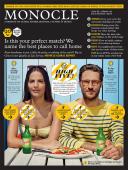
Issue 85
Is this your perfect match? We name the best places to call home. From handsome to just a little bit gritty, a ranking of the world’s Top 25 Cities in our Quality of Life Survey. Monocle Global Report
In This Issue
Oops! No content was found.
Looks like we no longer have content for the page you're on. Perhaps try a search?
Return Home

